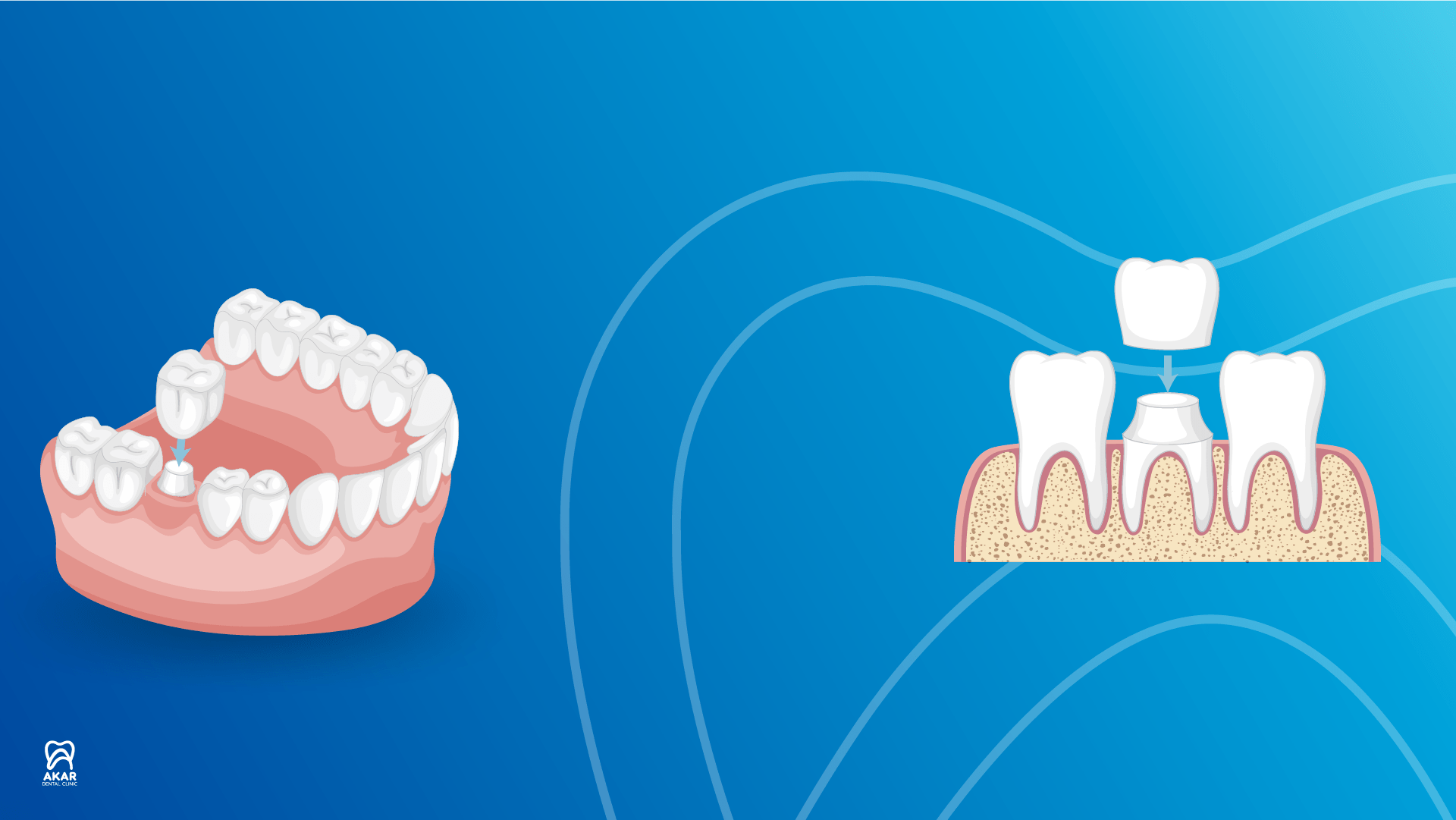

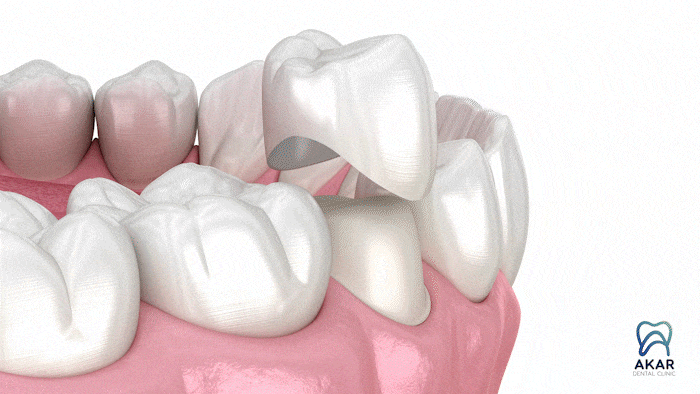 In dental treatment, the term “crown” refers to a dental restoration used to repair or replace a damaged, decayed, or weakened tooth. Crowns are commonly made of E-max, zirconium, or porcelain, and they can be customized to match the color and shape of your natural teeth. The treatments last between one and three days. However, when it is required for all teeth, it takes 4-7 days.
In dental treatment, the term “crown” refers to a dental restoration used to repair or replace a damaged, decayed, or weakened tooth. Crowns are commonly made of E-max, zirconium, or porcelain, and they can be customized to match the color and shape of your natural teeth. The treatments last between one and three days. However, when it is required for all teeth, it takes 4-7 days.
A dentist may suggest dental crowns for a number of reasons, such as to protect a tooth after a root canal, anchor a dental bridge, or cover a dental implant. A small portion of the damaged tooth structure is typically removed to place a dental crown. After that, an impression of the tooth is taken, and a temporary crown is placed. When the permanent crown is complete, it is cemented onto the tooth, restoring function and appearance.
At Akar Dental, we are committed to providing you the best treatment with affordable prices. We aim to exceed their expectations and help them achieve beautiful, healthy smiles that will last a lifetime. You can rely on us for dental services like crowns and smile makeovers.
What are Dental Crowns?
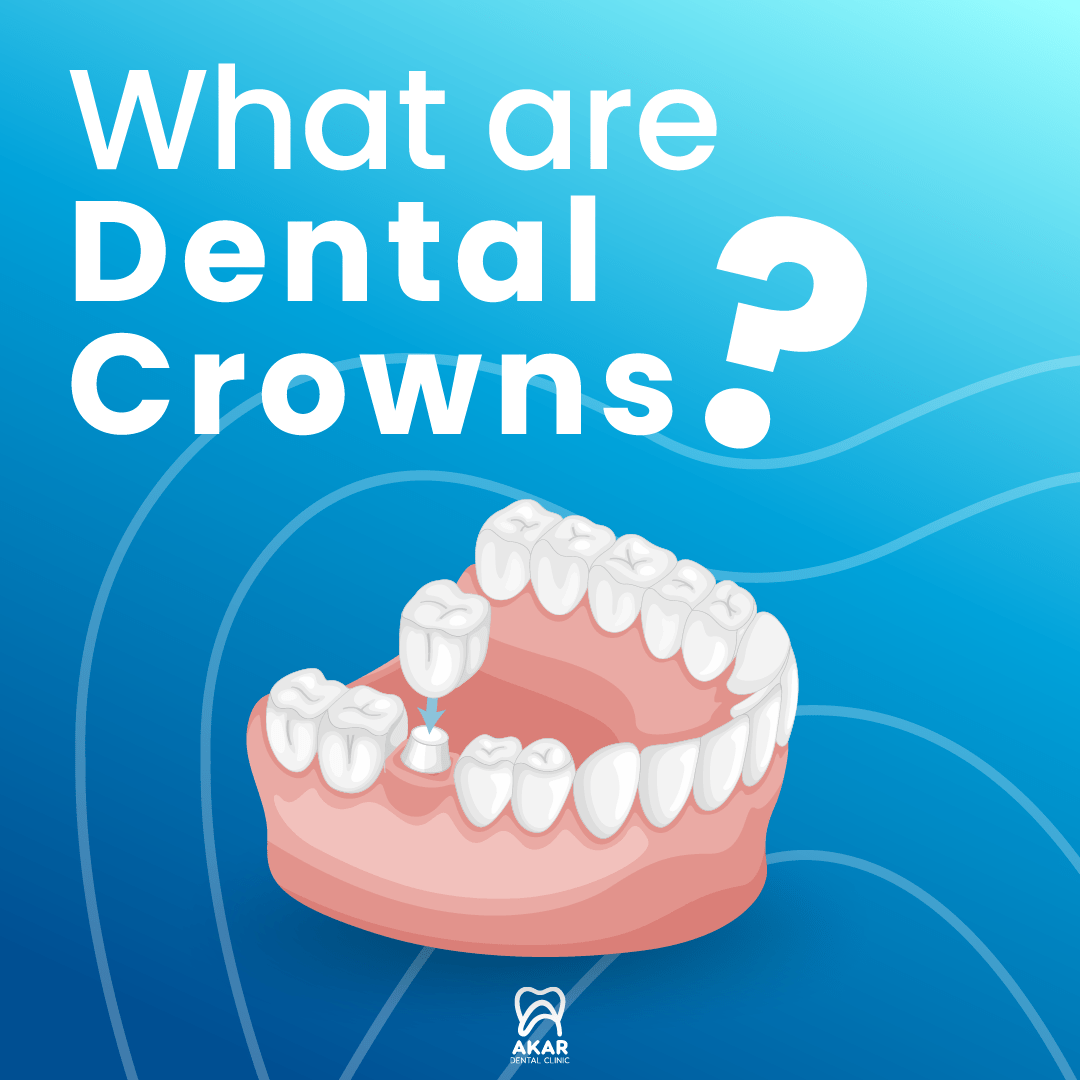 Dental crowns are permanent caps that replace the patient’s tooth. These caps strengthen the fracture of a weak tooth, are attached to the original tooth with various materials, and replace the original tooth. A dental crown may be recommended as a treatment option for a variety of reasons, including:
Dental crowns are permanent caps that replace the patient’s tooth. These caps strengthen the fracture of a weak tooth, are attached to the original tooth with various materials, and replace the original tooth. A dental crown may be recommended as a treatment option for a variety of reasons, including:
- To protect a weakened tooth: If a tooth is damaged or weakened by decay, trauma, or a root canal, a dental crown can be used to reinforce and protect the tooth from further damage or decay.
- To repair a broken tooth: If a tooth is fractured, chipped, or broken, a dental crown can be used to restore the tooth’s shape, size, and function.
- To improve the appearance of a tooth: If a tooth is discolored, misshapen, or otherwise unattractive, a dental crown can be used to improve the tooth’s appearance and create a more natural-looking smile.
Dental crowns may also be recommended if discoloration, decay, breakage, or disfigurement develops over time due to poor hygiene or medication use. This form of treatment involves physically strengthening teeth that are not strong enough for these reasons and, at the same time, covering them with an aesthetically better image.
Types of Dental Crown
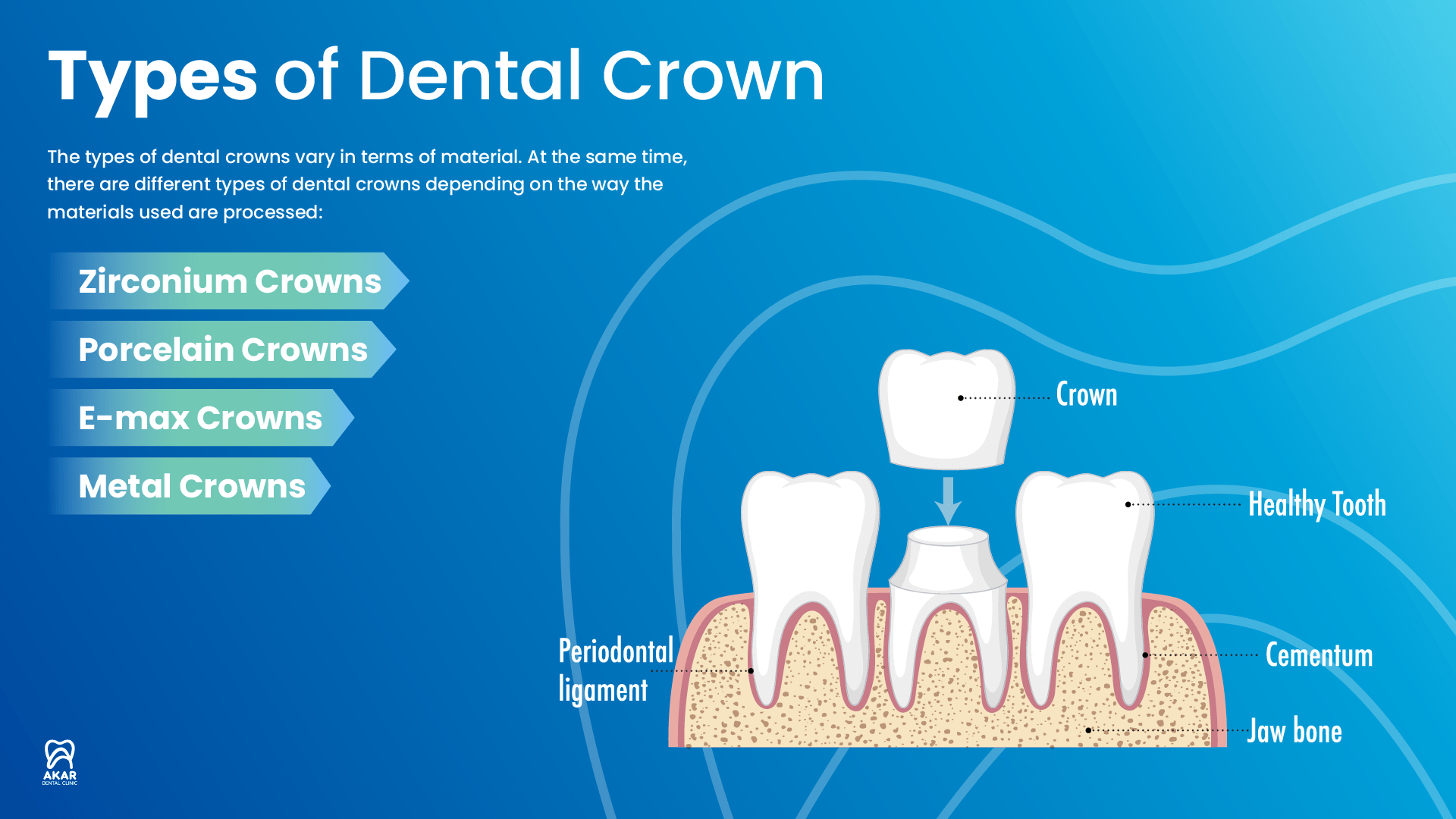 The types of dental crowns vary in terms of material. At the same time, there are different types of dental crowns depending on the way the materials used are processed:
The types of dental crowns vary in terms of material. At the same time, there are different types of dental crowns depending on the way the materials used are processed:
Metal Crowns
These crowns are made of various materials, such as gold, nickel, chromium, and palladium. These crowns, preferred to be durable for a long time in terms of breakage or wear, also have strong preferences regarding chewing and biting reflexes. Metal alloy design crowns can be used to treat molar crowns, especially those in the molar area.
Porcelain Crowns
A porcelain crown, also known as a porcelain-fused-to-metal (PFM) crown, is a type of dental crown that consists of a metal substructure covered with a porcelain overlay. The metal substructure provides the strength and durability needed to withstand biting and chewing forces. In contrast, the porcelain overlay provides an aesthetic appearance by mimicking the teeth’ natural color and translucency. Porcelain crowns offer several advantages over other types of dental crowns, including:
- Strength and durability: The metal substructure of porcelain crowns provides a strong and durable foundation. This makes them suitable for posterior (back) teeth subject to heavy biting.
- Aesthetics: The porcelain overlay can be color-matched to your natural teeth, resulting in a highly esthetic restoration.
- Precision: Porcelain crowns can be fabricated with high precision to ensure a perfect fit for your tooth.
- Biocompatibility: The metal used in the substructure of porcelain crowns is biocompatible, meaning it is non-toxic and non-allergenic.
All-ceramic or all-porcelain crowns offer a more aesthetically pleasing appearance because they are more similar to the natural tooth structure than porcelain fused to metal crowns, which are stronger than the former. These implants are ideal for use on front teeth because they have less contact with other teeth, reducing wear.
Porcelain crowns are commonly used to restore damaged or weakened teeth and can be used for both anterior (front) and posterior (back) teeth. However, porcelain crowns require more tooth reduction than other types of crowns, as the metal substructure needs to be accommodated. This can result in the removal of more of your natural tooth structure, which may compromise the long-term health of your tooth. Your dentist can evaluate your dental condition and recommend whether a porcelain crown is a suitable treatment option for you.
E-max Crowns
An E-max crown is a type of all-ceramic dental crown that is made of lithium disilicate ceramic material. The name “E-max” stands for “esthetic maximum” and refers to the high level of esthetics achieved with this type of crown. E-max crowns offer several advantages over other types of dental crowns, including:
- Aesthetics: E-max crowns have a natural translucency that allows them to mimic the appearance of natural teeth, resulting in a highly esthetic restoration.
- Strength and durability: E-max crowns are made of a strong and durable ceramic material that can withstand the daily wear and tear of biting and chewing.
- Precision: E-max crowns can be milled with high precision using computer-aided design and manufacturing (CAD/CAM) technology, ensuring a perfect fit for your tooth.
- Biocompatibility: E-max crowns are biocompatible, meaning they are non-toxic and non-allergenic, and are unlikely to cause any adverse reactions in the body.
E-max crowns are commonly used for both anterior (front) and posterior (back) teeth. They can be used to restore various dental conditions, including chipped or cracked teeth, heavily restored teeth, and teeth with large fillings. Your dentist can evaluate your dental condition and recommend whether an E-max crown is a suitable treatment option.
Zirconium crowns
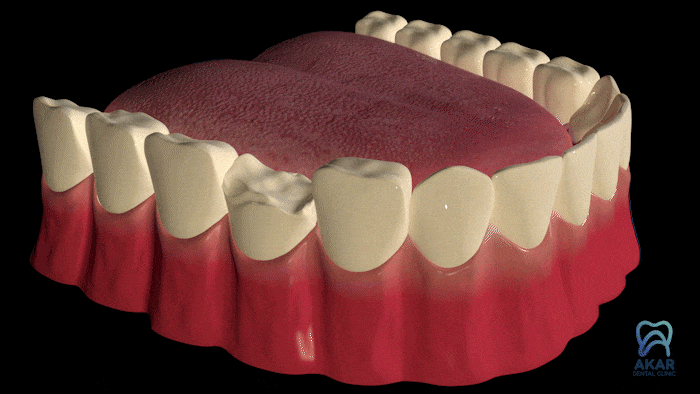 A zirconium crown is a dental crown made of a zirconium dioxide ceramic material. Zirconium is a strong and durable material commonly used in dental restorations because of its biocompatibility and aesthetic qualities. Zirconium crowns offer several advantages over other types of dental crowns, including:
A zirconium crown is a dental crown made of a zirconium dioxide ceramic material. Zirconium is a strong and durable material commonly used in dental restorations because of its biocompatibility and aesthetic qualities. Zirconium crowns offer several advantages over other types of dental crowns, including:
- Strength and durability: Zirconium is a very strong and durable material that can withstand the daily wear and tear of chewing and biting.
- Biocompatibility: Zirconium is biocompatible, meaning it is non-toxic and non-allergenic, and is unlikely to cause any adverse reactions in the body.
- Aesthetics: Zirconium crowns are tooth-colored and can be customized to match the shade of your natural teeth, making them a popular choice for patients concerned about their smile’s appearance.
- Precision: Zirconium crowns can be milled with high precision using computer-aided design and manufacturing (CAD/CAM) technology, ensuring a perfect fit for your tooth.
Zirconium crowns are commonly used to restore damaged or weakened teeth and can be used for both anterior (front) and posterior (back) teeth.
How to Choose the Right Type of Dental Crown?
The process of choosing the right type of dental crown can be decided by the patient and the doctor, with the patient’s wishes as well as the patient’s current health conditions taken into consideration. Therefore, patients who come to our clinic specify their preferred material for crown treatment. If the patient’s health conditions are compatible with any type of crown, the crown design and preference are created at the patient’s request. However, if the type of crown desired by the patient is unsuitable for his/her health, then different types of crowns are designed and applied to the tooth. The patient and the doctor again decide on these crowns to meet the patient’s wishes.
Dental Crowns Process
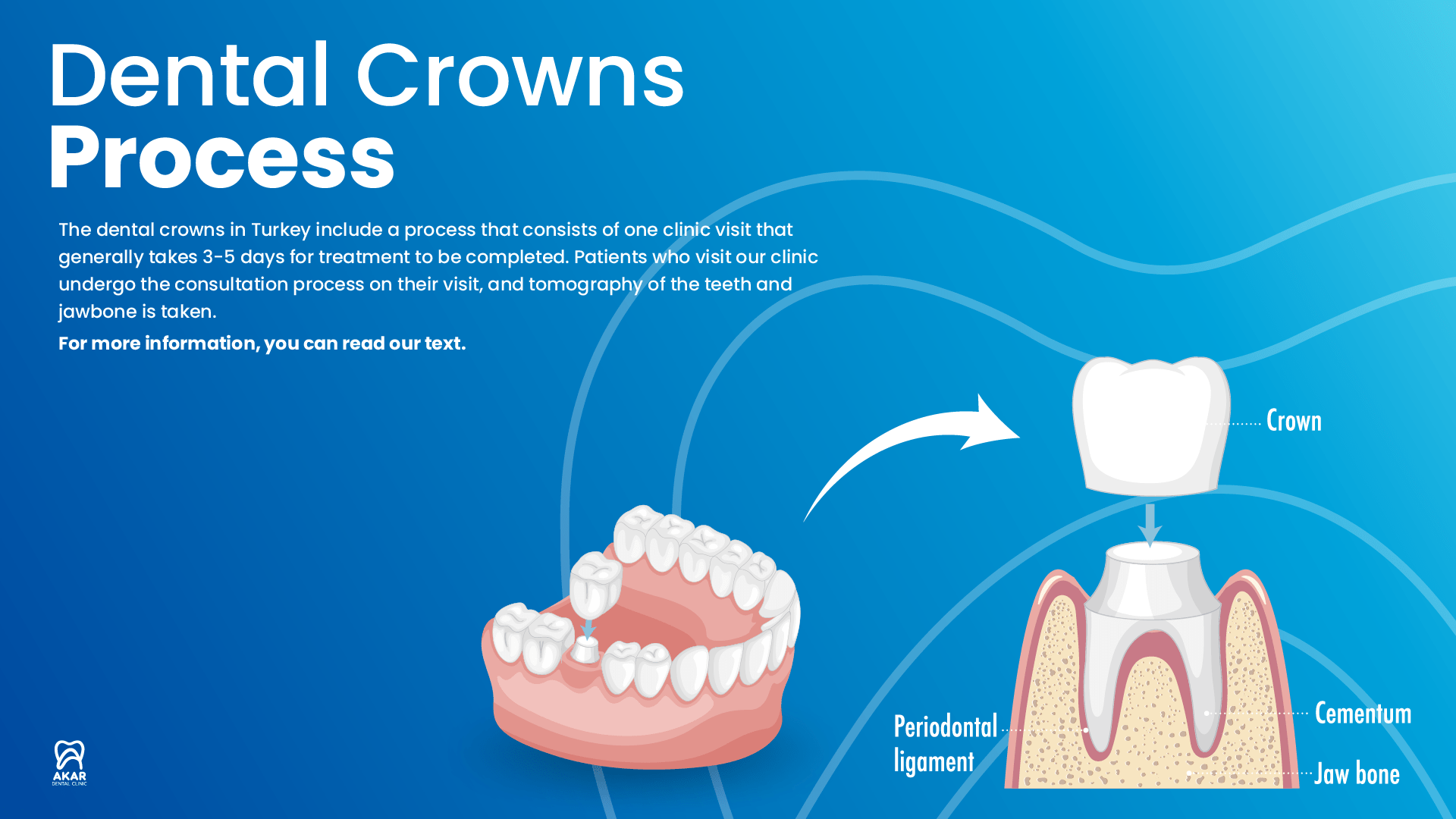 The dental crowns in Turkey include a process that consists of one clinic visit that generally takes 3-5 days for treatment to be completed. Patients who visit our clinic undergo the consultation process on their visit, and tomography of the teeth and jawbone is taken. After the tomography, the general health condition of the teeth is checked. If the patient has decay, injury to the tooth enamel, damage to the pulp, or a risk of infection in the tooth, he/she is referred to other dental services that we offer, such as root canal treatment or tooth extraction. If the patient is suitable for dental crowns, the following steps are taken:
The dental crowns in Turkey include a process that consists of one clinic visit that generally takes 3-5 days for treatment to be completed. Patients who visit our clinic undergo the consultation process on their visit, and tomography of the teeth and jawbone is taken. After the tomography, the general health condition of the teeth is checked. If the patient has decay, injury to the tooth enamel, damage to the pulp, or a risk of infection in the tooth, he/she is referred to other dental services that we offer, such as root canal treatment or tooth extraction. If the patient is suitable for dental crowns, the following steps are taken:
- Consultation: The first step is to discuss your preferences, requirements, and concerns with your dentist. Your dentist will examine your tooth and take X-rays to determine the best treatment that suits you.
- Treatment: Your dentist will first clean out any decay from the tooth before shaping it to accommodate the crown.
- Dental Impression: To create a mold, your tooth will be photographed using a digital scanner or a putty-like material.
- Temporary Crown: To protect the prepared tooth while the permanent crown is being made, your dentist may place a temporary crown on it.
- Placement of the Permanent Crown: After the temporary crown has been removed and the prepared tooth has been prepared, your dentist will place the permanent crown over the prepared tooth and cement it.
With these steps, you can restore a tooth to look and work like new. After the procedure, it is crucial to practice good oral hygiene to ensure the durability of the dental crown.
Difference Between Veneers and Dental Crowns
The veneer is a thin piece of porcelain glued to the front of the tooth. The porcelain is colored to imitate the color of your real teeth. The veneers are brittle and can be cracked. On the other hand, when it comes to dental crowns, the entire tooth is covered with a crown. Ceramics, porcelain, or a mixture can be used to create it. It is usually about twice as thick as a veneer, which makes it more robust and durable. Also, veneers are a less invasive treatment option than crowns.
At Akar Dental, we are committed to providing the most advanced and up-to-date technology in dentistry. With our cutting-edge Tomography and X-ray devices, CAD CAM technology, and advanced design software, we can deliver personalized and precise treatment plans that meet each patient’s unique needs and expectations.
Advantages of Dental Crowns
Dental crowns offer several advantages, including:
- Protection: Dental crowns can protect weak or damaged teeth from further decay, fractures, or other types of damage. They also provide added support to teeth that have undergone root canal therapy.
- Restoration: Dental crowns can restore the function and appearance of damaged or weakened teeth, allowing you to eat, speak normally, and smile confidently.
- Durability: Dental crowns are designed to be strong and durable and can last for many years with proper care.
- Comfort: Dental crowns can be designed to fit comfortably over your natural teeth, allowing you to chew and speak without discomfort or pain.
- Aesthetics: Dental crowns can be made to closely match the color, shape, and texture of your natural teeth, resulting in a highly esthetic restoration.
- Versatility: Dental crowns can treat many dental problems, including decay, fractures, cracks, and discoloration.
- Easy maintenance: Dental crowns are easy to care for and require the same level of oral hygiene as your natural teeth, including brushing twice daily and flossing daily.
Dental crowns are a highly effective and versatile treatment option for restoring damaged, missing or weakened teeth and improving your smile’s overall health and appearance.
Who Needs Dental Crowns Treatment?
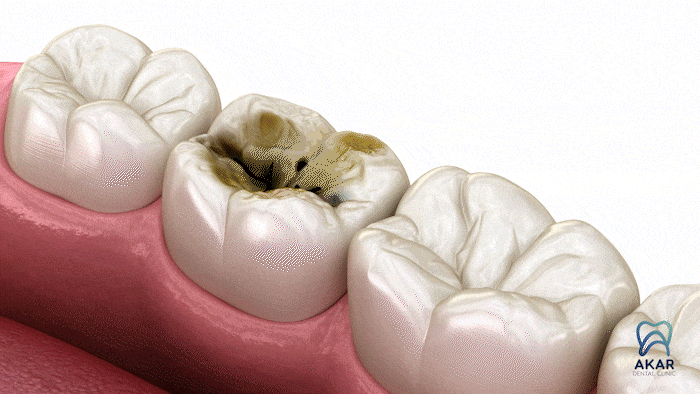 A dentist can recommend dental crowns for various reasons, including strengthening a weakened tooth, protecting a tooth after a root canal, anchoring a bridge, or covering a dental implant. The procedure for placing a dental crown typically involves removing a small amount of the damaged tooth structure, taking an impression of the tooth, and placing a temporary crown while the permanent crown is fabricated. Once the permanent crown is ready, it is cemented onto the tooth, restoring its function and appearance.
A dentist can recommend dental crowns for various reasons, including strengthening a weakened tooth, protecting a tooth after a root canal, anchoring a bridge, or covering a dental implant. The procedure for placing a dental crown typically involves removing a small amount of the damaged tooth structure, taking an impression of the tooth, and placing a temporary crown while the permanent crown is fabricated. Once the permanent crown is ready, it is cemented onto the tooth, restoring its function and appearance.
At Akar Dental, we aim to offer our patients the most appropriate treatment options for all the treatments we apply in our clinic. Moreover, the first treatment of our patients who come to our clinic is carried out primarily by our head physician. Our specialists continue to use the appropriate treatment method. We pay attention to the presence of the following characteristics in the patients for whom we perform dental crown in Turkey applications in our clinic:
- Teeth with significant decay or damage: A dental crown can help restore a tooth’s function and shield it from further harm if it has significant decay or damage.
- Teeth that have undergone a root canal procedure: Root canal-treated teeth tend to weaken and fracture. A dental crown can be placed over the tooth to strengthen and protect it from further damage.
- Broken or chipped teeth: Dental crowns can repair a broken or chipped tooth’s size, shape, and function.
- Misshapen or discolored teeth: Dental crowns can make discolored or misshapen teeth look better.
- Large fillings: To support the remaining tooth structure and stop further decay, teeth with large fillings may benefit from a dental crown.
- Missing tooth: Bridge or implant treatment solutions are applied for those who have tooth loss.
Your dentist will be able to determine whether a dental crown is a suitable treatment option for your specific dental condition, after a thorough examination and evaluation of your oral health.
In the same way, conditions such as the patient’s avoidance of smiling due to decayed teeth, the tooth being open to infection, and difficulties with biting are also reasons the patient must obtain a dental crown.
Dental Crowns Aftercare
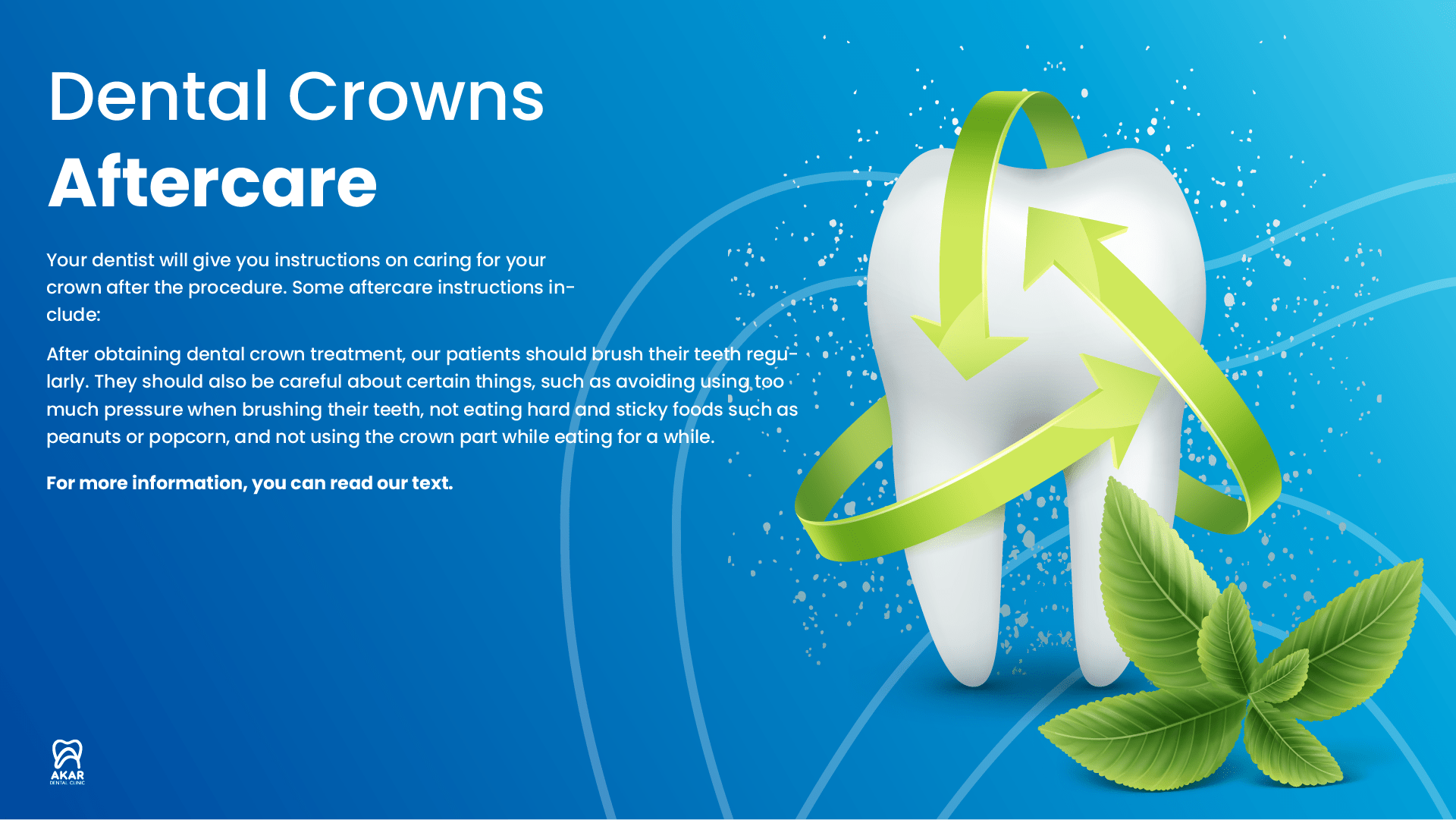 Your dentist will give you instructions on caring for your crown after the procedure. Some aftercare instructions include:
Your dentist will give you instructions on caring for your crown after the procedure. Some aftercare instructions include:
After obtaining dental crown treatment, our patients should brush their teeth regularly. They should also be careful about certain things, such as avoiding using too much pressure when brushing their teeth, not eating hard and sticky foods such as peanuts or popcorn, and not using the crown part while eating for a while.
Also, antibiotics and painkillers may be taken for specific periods regularly, if it is recommended by the dentist. Make sure to visit your dentist regularly for routine cleanings and check-ups. Do not try to open crusty foods by breaking them with your permanent crowns, due to the comfort of use provided by dental crown treatment. After the procedure, try to prefer soft textured foods. Stay away from smoking for at least two weeks, and gargle in your mouth after smoking.
Dental Crowns and Smile Makeover
Dental crowns are an important part of a smile makeover, which is a comprehensive cosmetic dentistry treatment plan aimed at improving the appearance of your smile. A smile makeover may include a variety of cosmetic dental treatments such as teeth whitening, dental bonding, porcelain veneers, and dental crowns.
Dental crowns can be used to address a variety of cosmetic dental issues as part of a smile makeover, including:
- Teeth that are severely discolored or stained but cannot be effectively treated with teeth whitening can be covered by dental crowns.
- Misshapen or uneven teeth can be improved in shape and symmetry with dental crowns.
- Dental crowns can be used to close gaps or spaces between teeth, enhancing the appearance of your smile overall.
- Teeth that are chipped or cracked can be restored in appearance with dental crowns, resulting in a more attractive and natural-looking smile.
- Dental crowns can cover and shield teeth with large fillings, resulting in a more uniform and enticing smile.
If you are considering a smile makeover, your dentist can evaluate your dental condition and recommend the most appropriate treatment solutions, including dental crowns, to help you achieve your desired smile. With the help of dental crowns and other cosmetic dental treatments, a smile makeover can improve your confidence, self-esteem, and overall oral health.
Located in the beautiful city of Antalya, Turkey, our clinic offers excellent dental care and allows our patients to enjoy the surrounding area’s various activities. Our experienced cosmetic dentists and surgeons provide various implant treatment solutions, including All-on-4 and All-on-6 implants, non-surgical implant options, bone grafting, and sinus lifting.
Why Choose Turkey for Dental Crowns?
Turkey is a country that offers highly developed opportunities and treatment options in the field of dentistry. You can get the best dental crowns in Turkey treatment by visiting Akar Dental Clinic to have a great look and to have appropriate treatments in terms of dental health. We offer our patients both budget-friendly and superior-quality dental crown treatment and operation services with our computer-aided programs, tomography devices, and expert medical staff.
The dental crown procedure in Turkey requires two or three clinic visits which can be completed in 3-5 days.
Dental crown treatment is not painful, and anesthesia techniques are used during the treatment stage if necessary.
The dental crown allows you to get both an aesthetic and a solid tooth without losing your original tooth. For this reason, the procedure makes your daily life easier.
The duration of use of the dental crown depends on the type of crown used and how the patient takes care after crown treatment. However, many crown types can be used for 15-20 years.
Fifteen days after the permanent crown procedure, the patient can easily return to the old eating routine. After a few days after the procedure, our patient starts to get used with the crown in his/her mouth.
Incorrectly positioned or incorrectly preferred crowns may fall. At the same time, how the patient looks at the crown is also important. In our clinic, we complete the correct crown selection and placement process and provide information about aftercare to our patients after treatment.
Crowns stop tooth decay. For this reason, tooth decay under the crown is not a common condition.
The zirconium crown structure is one of the most aesthetic and strong types of crown.
You can contact us to get more information about our oral and dental health treatments and the opportunities we offer.